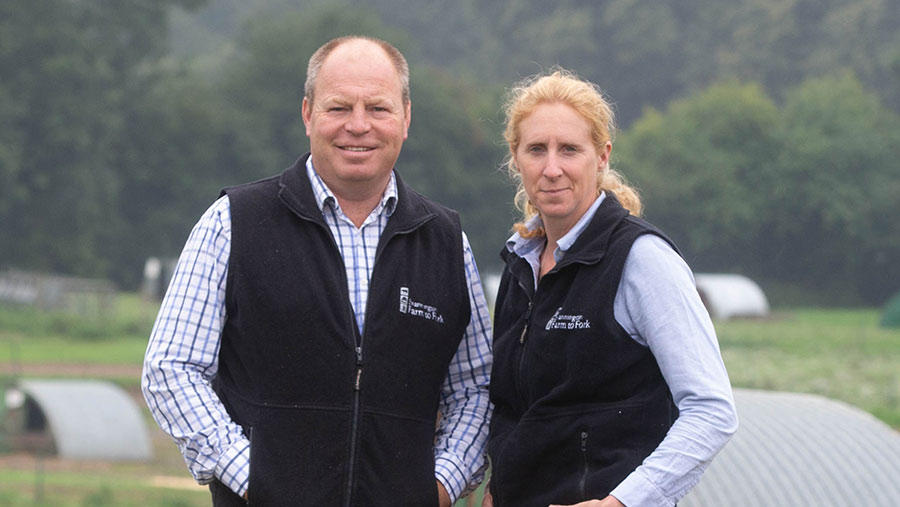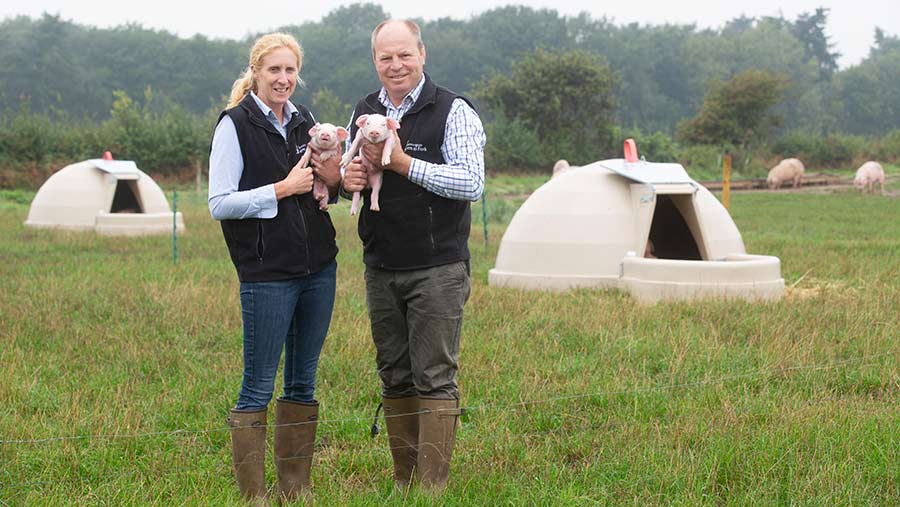Farmers Weekly Awards 2018: Pig Farmer of the Year
 Rob and Helen Mutimer © Tim Scrivener
Rob and Helen Mutimer © Tim Scrivener Rob and Helen Mutimer are the Farmers Weekly 2018 Pig Farmers of the Year.
Husband-and-wife team Rob and Helen Mutimer are a dynamic couple – farming a high-welfare breeding herd of 700 outdoor Landroc sows and finishing all progeny in straw-based sheds through to slaughter for a mix of markets.
Partners in the family farming business, both Rob and Helen are highly customer focused. They bring different but complementary skillsets to the enterprise – producing pigs for Waitrose as well as supplying pork to local eateries via their own butchery.
Some 250 pigs a week at 105kg go into Tulip at Spalding for the Waitrose supply chain. A further 30 pigs a week are transported to the local abattoir and returned to the on-farm butchery to supply about 150 pubs, restaurants and colleges through the Swannington Farm to Fork business.
See also: Meet the Farmers Weekly 2018 Pig Farmer of the Year finalists
Rob and Helen Mutimer
Mutimer Partnership, Swannington, Norfolk

Rob and Helen Mutimer © Tim Scrivener
Farm facts
- 700 outdoor Landroc sows with Landrace grandparent herd supplying replacement gilts
- 13,000 pigs produced annually for Waitrose supply chain via Tulip
- 30 pigs a week butchered and supplied to local pubs, restaurants and colleges
- Three-weekly batch farrowing, closed herd with 100% AI
The all-in, all-out grower-finisher system sees all accommodation fully cleaned and disinfected between batchs. A Landrace grandparent herd supplies replacement gilts on a system using 100% artificial insemination and chaser boars.
Weaners are moved into tents at 28 days on another farm three miles away, where they are grown to 25kg, producing some 14,000 pigs a year. At 25kg, pigs are transported to one of four finishing farms within a 10-mile radius.
A major setback in 2015 – when the breeding herd was diagnosed with swine dysentery – has proved no obstacle to success. The herd was depopulated immediately – recognising that medication was unlikely to be successful and would potentially affect other farmers in the region.
This selfless decision saw the last of the finished pigs slaughtered in April 2016 and a three-month rest period followed, with all machinery, equipment and buildings undergoing a strict cleaning and disinfection protocol, land ploughed and new paddocks drilled.
Moving forward
Rather than allowing swine dysentery to define them as pig producers, Rob and Helen used it to their advantage. They sought to learn from the outbreak, improve farm biosecurity – which was already good – and focus on the new herd and celebrate its improved performance.
Farrowing rates have since increased from 83% to 90%, with a 3% drop in pre-weaning mortality. Biosecurity improvements have included an on-farm incinerator and rearranged transport movements to eliminate any risk of cross-contamination from wheels.
Technology is key to the business’ success. All breeding and finishing data is recorded using Agrosoft Pigvision. Electronic ear tags aid sow recognition. A carbon monoxide monitor and wind speed recorder have improved their understanding of ventilation – and so gave pig health a boost.
Keen to expand as opportunities allow, Rob and Helen are in negotiation to buy and develop a new pig finishing unit. This will enable them to grow the sow herd – while researching and installing upgraded technologies to further improve pig health, welfare and performance.
The local market of pork from Swannington Farm to Fork has been growing at about 15% annually and is expected to increase through a strong emphasis on customer-focused sales, efficiency savings through technology and stringent financial recording and planning.
People-focused
This is very much a people-focused business. Farm staff are viewed as an integral part of the team – and all receive the relevant training for their positions using AHDB and Poultec courses. Employees include stockmen, butchers and administrative staff.
As a sign of their commitment to staff, Rob and Helen set up an employee forum. It has proved to be a great method of harnessing fresh ideas and bringing new knowledge into the business – ensuring its ongoing success and helping it keep ahead of the competition.
A major achievement of the forum has been the development of a new weaning vaccination and sexing facility. This has reduced the manual handling of piglets by 80%. Two stockmen were previously lifting up to 1,000 piglets with a total weight of 7.5t.
Welfare of both staff and livestock are at the forefront of thinking on this farm. The new facility has dramatically reduced the stress of both piglets and stockmen – saving 10 man hours every weaning with a payback time of just 10 months.
Constantly looking to improve the business, Rob and Helen established a profit share scheme so staff receive 20% of annual profits. Rewarding employees as a team, rather than individuals, highlights their inclusive ethos – and everyone involved in the enterprise is a worthy winner.
Winning ways
- Successful family-run and customer-focused business
- Strong employee engagement, including profit-sharing scheme and staff forum
- Good succession planning and business structure that plays to the strengths of family members across the generations
- A high-welfare system that has very low antibiotics use
A word from our independent judge
“An outstanding business that produces top-quality, high-welfare pigs while playing to the strengths of everyone involved. Their outward-facing approach, attention to detail and quest for ongoing success mean Rob and Helen should be seen as ambassadors for the industry.”
Zoe Davies, chief executive, National Pig Association
The other finalist was:
- Christian Andersen, Bedfordia Farms, Milton Earnest, Bedfordshire
